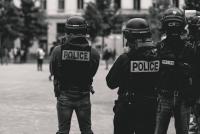Written by Amelia Eckles
(Content warning: mention of death, police violence.)
Elijah McClain, a 23-year-old massage therapist, died after an encounter with Aurora Police in August 2019. McClain was anemic - and wearing a ski mask, something he did even in the summertime because he was often cold. A 911 caller reported this as suspicious behavior, and less than a minute after making contact, police officers put Elijah in a chokehold that restricted blood flow to his brain and rendered him unconscious. He died in the hospital a week later.
It may be tempting to call this encounter and the killing of Elijah a tragedy, but it’s important to remember that this is the same police department that brought James Holmes, Century 16 Movie Theater mass murderer, into custody alive. Why would a young man walking home be considered more of a threat than a mass murderer who killed 12 people and injured 70 others?
When these instances are taken into consideration with national trends, the data becomes all the more revealing. Police spend, on a national average, about 4% of their time addressing violent crime; that means the other 96% of the time, they are responding to concerns they are not best suited to address. Furthermore, The American Journal of Preventive Medicine found that 20% of deaths due to lethal force by law enforcement involved someone with a mental health condition, and Black people were 2.8 times more likely to be killed by law enforcement than white people, despite being the racial demographic least likely to be armed.
Given these realities and the potential for an altercation with the police to escalate, what are you supposed to do? Say you see something that seems suspicious or makes you uncomfortable, but doesn’t pose an immediate threat of violence, what options do you have?
Denver Public Library held two virtual panels to answer those questions, and more, earlier this fall. Moderated by the Conflict Center and paneled by representatives from DASHR and The Kaleidoscope Project, as well as a community organizer and an education professional, what follows is compiled from both conversations, to bring awareness to existing resources that serve to build safety for our communities.
Support Team Assistance Response: 720-913-STAR (7827)
Earlier this year, a pilot program was launched to handle 911 calls concerning homelessness, mental health, and addiction with the expertise of both a Denver Health paramedic and a Mental Health Center of Denver social worker, rather than police officers. STAR has since answered over 500 calls and has not once needed police back up - in fact, it’s actually the other way around, where police are requesting help from STAR. The pilot is modeled after a program that’s been in existence for over 30 years in Eugene, Oregon called CAHOOTS (Crisis Assistance Helping Out On the Streets). STAR is currently limited to the downtown area of Denver from 10am-6pm Monday through Friday.
Denver Alliance for Street Health Response: 720-432-4086
DASHR is a coalition committed to transforming public safety that helped to get the STAR program off the ground this summer. They provide community tools to navigate crises such as “street medic trainings, overdose response trainings, and restorative practices.”
Colorado Crisis Services: 1-844-493-8255
(or text “TALK” to 38255)
Not only does CCS offer a free, 24/7 helpline, they also have multiple walk-in crisis centers throughout the city to provide community members with substance use and mental health services.
Harm Reduction Action Center: 303-572-7800
The HRAC is a resource for working humanely with intravenous substance users. They offer syringe access from 9am-12pm Monday through Friday.
Conflict Center
The Conflict Center approaches conflict as an opportunity for learning and connection, rather than something to be avoided. They provide specific classes for adults, youth, parents, and organizations.
These programs exist to help us navigate being in a society together--but we all carry a responsibility to make sure we’re taking care of one another. Here’s how you can help:
- Save the numbers listed here in your cell phone.
- Donate to the STAR Program.
- Volunteer with DASHR every Sunday from 8am - 11am. Meet at 20th and Lincoln to provide food and water to folks experiencing homelessness, and talk to business owners about alternatives to the police.
- Take a class with the Conflict Center to better address conflict in your day-to-day life.
- Encourage local elected officials to spend taxpayer money in an effective, dignifying way.
If you find yourself in a situation where your first instinct is to call 911, pause, try to reflect to understand your discomfort and determine whether a call is necessary - or if another service might be more appropriate.
Additional Resources:
211 Colorado
Calling 211 will confidentially connect you with services across the state including food pantries, overnight shelters, and more.
311 Help Center
(if you’re calling outside Denver: 720-913-1311)
Calling 311 will help you navigate city services such as ballot drop off locations, up to date information about COVID-19, online vehicle registration, and more.
National Lawyers Guild: Colorado Chapter
The NLG offers legal support when observing police violence.
Don’t Call the Police: Denver
This website breaks down community-based alternatives to the police by city and by category (ex: LGBTQ, housing, mental health, etc).
Steps to Ask Yourself Before Calling the Police Flowchart
SURJ Denver provides a list of questions to use to assess situations where you might think to call the police. It includes local resources.
Bystander Intervention and De-escalation Training: Webinar
Provided by the American Friends Service Committee, this training helps attendees to prepare for instances of violence and take action to counter it.
Beyond Survival: Strategies and Stories from the Transformative Justice Movement
Afraid to call 911, but not sure what to do instead? Here are strategies for accountability beyond the criminal justice system. This anthology is available for checkout from Denver Public Library.
